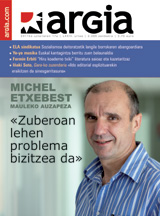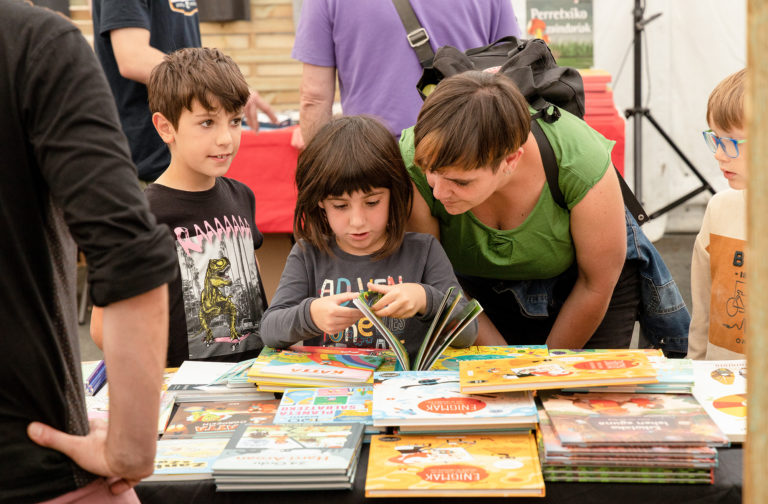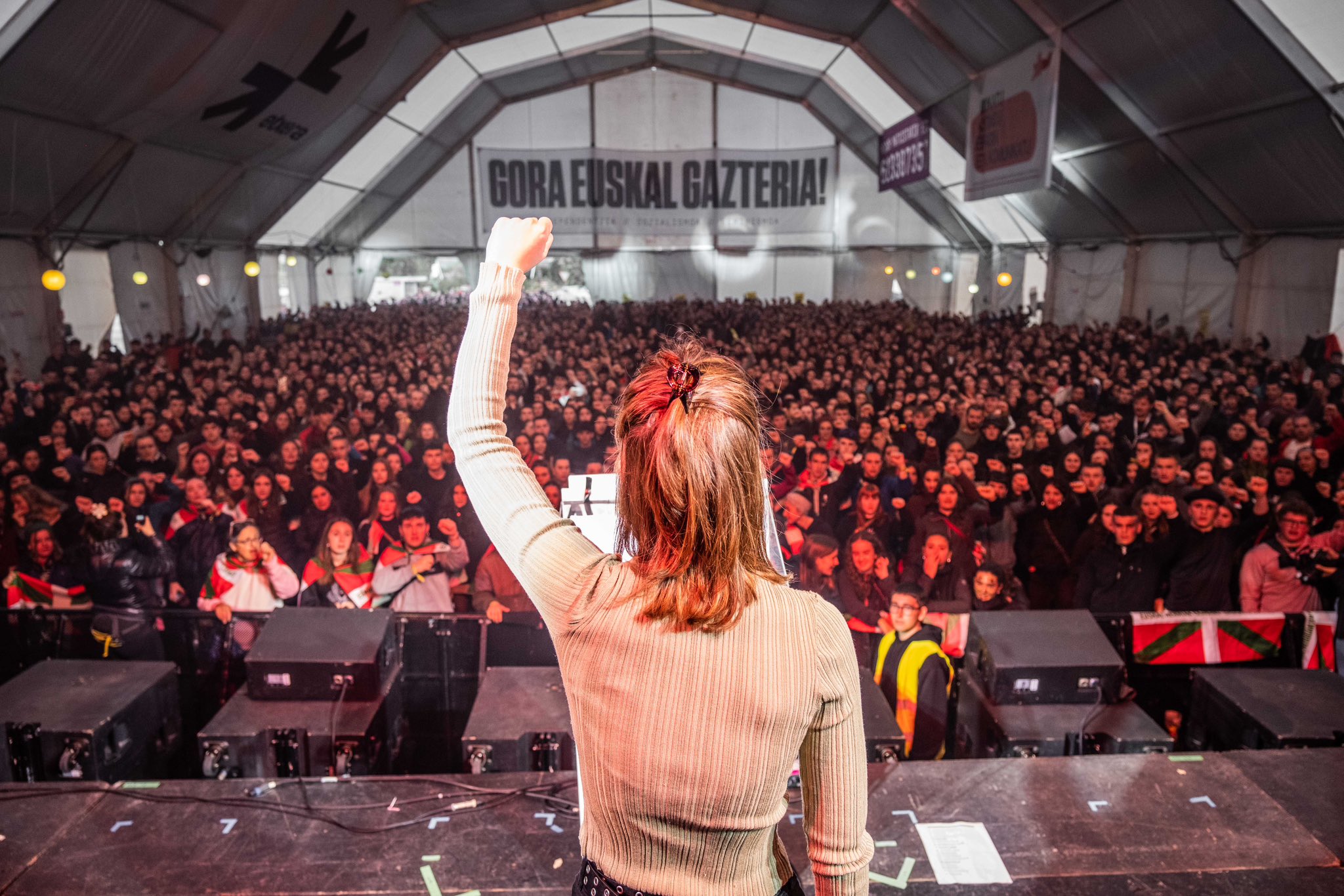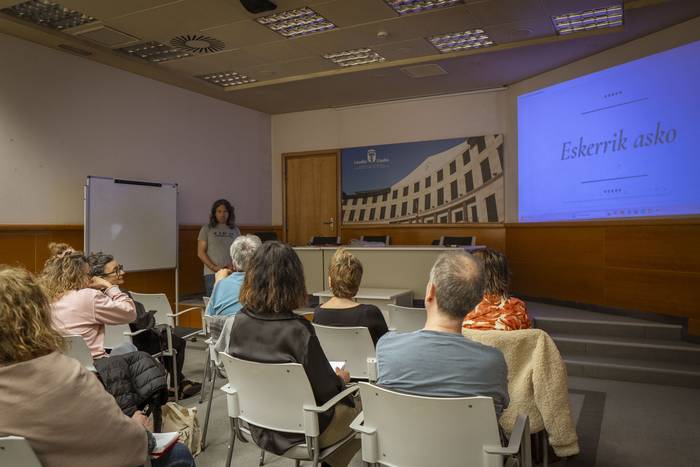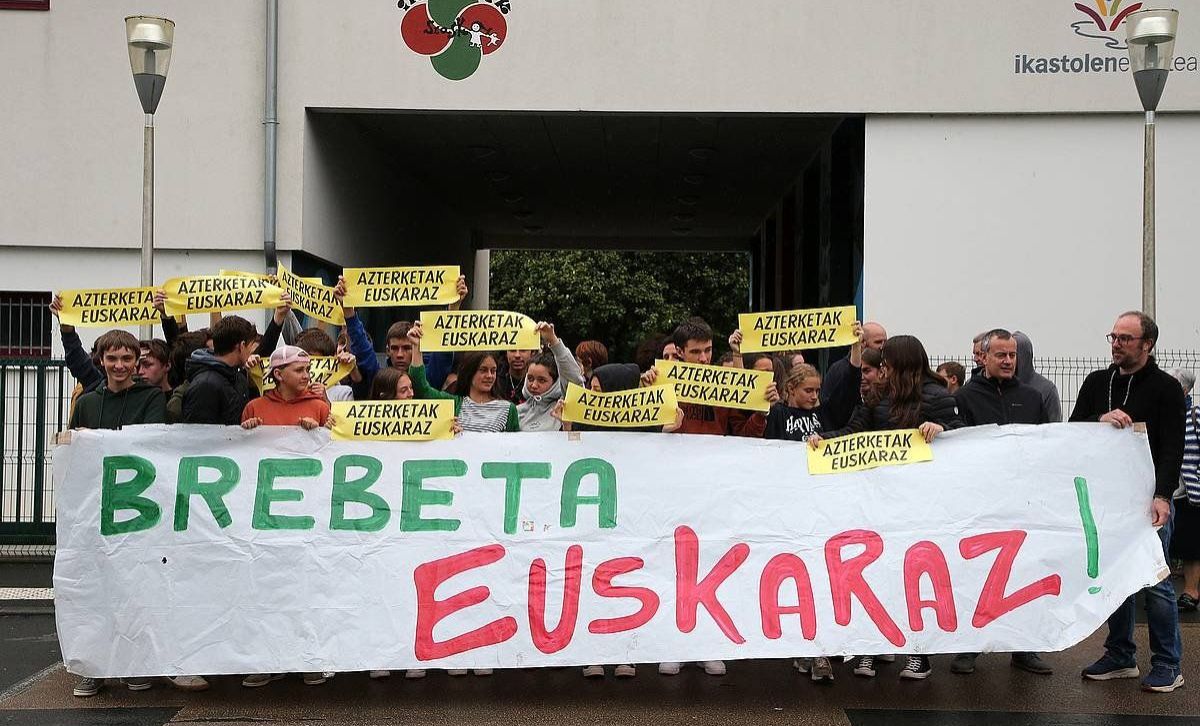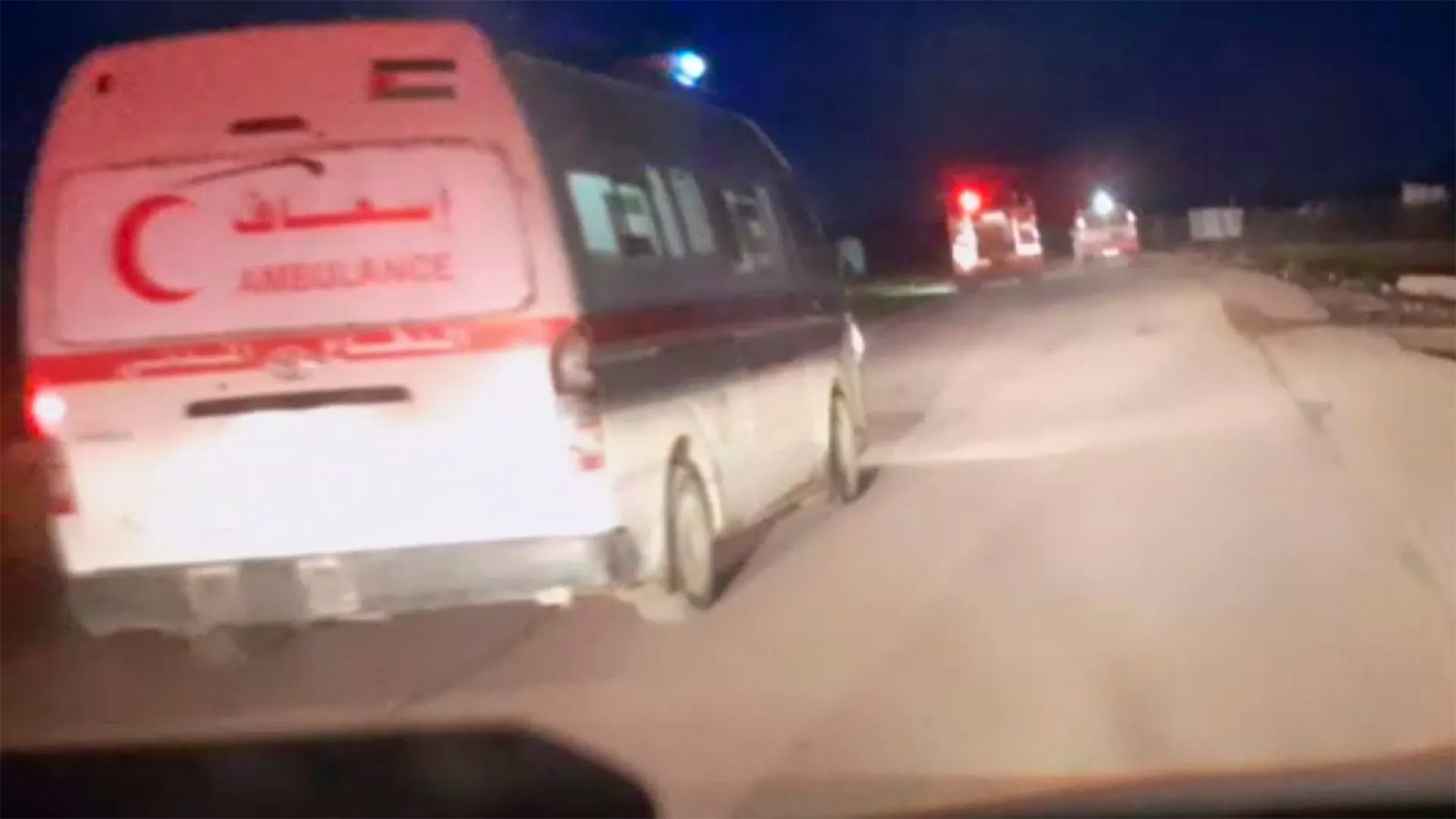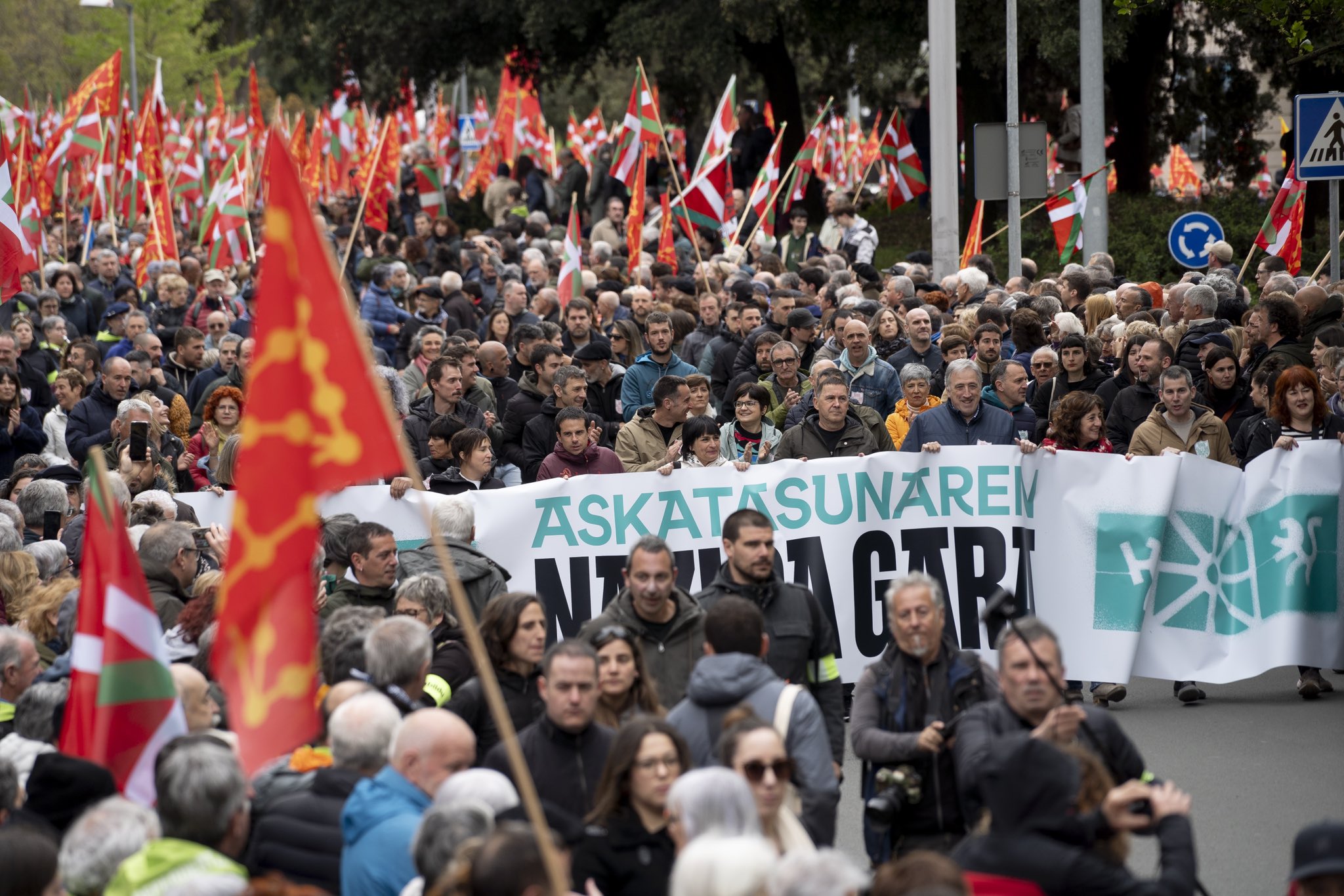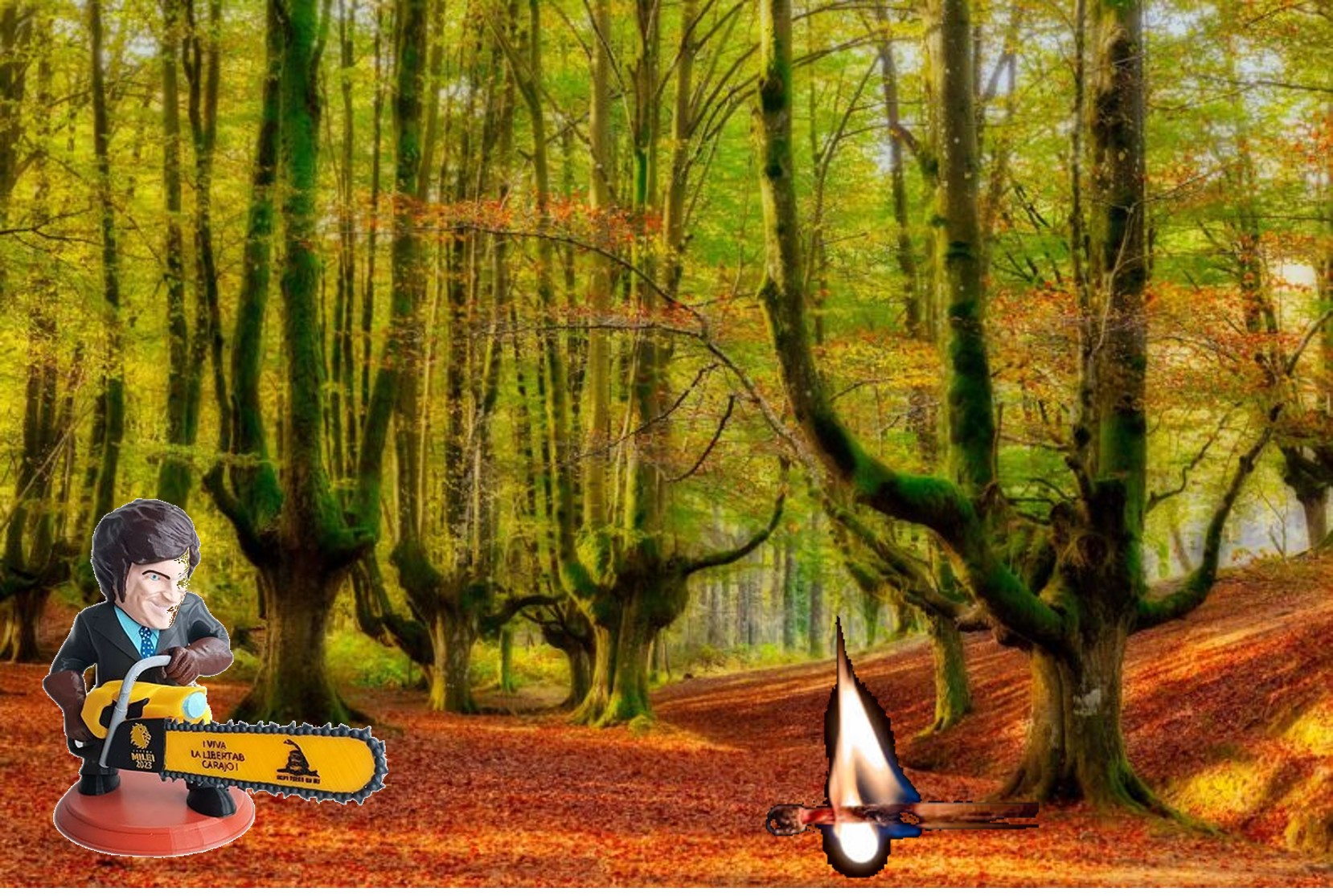"There are cases like Primo Levi everywhere."
- Fermin Erbiti (Pamplona, 1964) X. Last year he won the Juan Zelaia Prize with the Hiru koaderno txiki session (ex aequo, with Kepa Larrea taking shadows). He has worked in various areas of journalism, such as the press, radio and television. Since 1993 he has been responsible for communication from the Chamber of Comptes of Navarra.
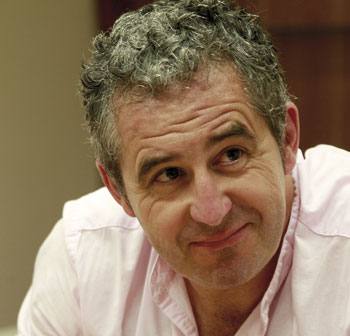
“I was surprised by the Juan Zelaia Prize. For the last two years I have been making texts, quiet, without objectives... I saw in the press the call for the Zelaia prize, and I decided to sort out, adapt and present a little more of those texts. Even if we don’t give them any prizes, they will get to know each other and maybe publish it,” Fermin Erbiti told us at the starting point of the conversation.
Why did you stop the Three Little Notebooks session?
I have found the starting points of the texts in the books, but not all of them. There are also movies and songs or successive reflections of a phrase heard from someone. Most of them are sentences taken from books. That is why I started to throw away, with the intention of offering my little thought, always without mentioning the last points, but with the intention of contributing my contribution. I took most of the books in libraries. But I couldn't make any comments or point, because I had to return it. I like to write in the book. So I kept three little notebooks. When I filled all three of them, I said to myself. “Maybe you can get some serious stuff out of them, start working.”
Do you have a tendency to go to libraries, people also have a habit of going around you?
The main library was here, next to the house of Comptos; in San Francisco Square. For me, perfect. He has recently been moved to the west of Pamplona, to the other end... I've always used the library a lot. I would say that people use it, and that there are things that are well-ordered, another thing is how they care for libraries. I know some good librarians, that is, politicians also take the library into account. After all, that investment does not give many votes, does it?
“Books are full of ideas that amaze us,” he said.
The book lets you meet a lot of interesting people. For example, I read Primo Levi's books and then I thought, In Pamplona – and in Navarra in general – we will have writers of their style, perhaps not of their quality – of stories about Nazis, but what happened and was written in Navarra in the war of 1936 is very interesting. The accounts of the winners and losers... In the war, some were book lovers, even among the winners. Some Falangists were of high cultural level and there are interesting testimonies of them. We can go backwards and get to know what the losers said.
There's something to explore, I mean.
Yes. Some people want to forget some things today... For example, the Count of Rodezno or the lives of Galo Vierge [The Culprits; Pamiela] are truly interesting. What moved me was what the Vierge said to me: On Friday of Easter the procession in San Antón Street, where the Virgin was, the painful one, is paralyzed. She stays, and a half-crazy woman tells another one: “You cry because you have been killed by a son, for I have been killed by five children.” People were on their knees. Terrible. In other words, we have been told that it was suffering, but how each party has told it, or how the winners have reflected it. It was the same, but everyone tells it in their own way. Knowing that is very important. The case of García Serrano is also there: the Pamplona, his son made an interesting book, they gave him a prize for his book The Great Hope. I met these writers in the search for Primo Levi's book. I mean, there are people like Primo Levi everywhere.
You are critical of the press. Are there many journalists in Spain?
I'm talking about Kapuscinski's passage in this sense. “Good journalists are humble people who respect and show that attitude...” In other words, radio or television is turned on and empathy is lost in the press, especially in the Spanish media. I'm amazed. At the Faculty they told us in a while that “in Spain there is no yellow press, all the newspapers are of quality. In Britain, for example, there are newspapers that are not serious ...". But within what is said here is good, what isn't there? The tone of the media is often predominantly the message.
“Monterroso doesn’t write, he directs.” Oscar Wilde has removed the comma from the text in the morning and put it back in the afternoon. What is your writing experience?
(Laughter) Well, pick up and resume the text. That happens to me a lot. When I worked in the press, I spent a lot of time in the newspaper with commas and others. The next day I read the text again and thought, “Why did I take that coma?” Despite the many laps it gives, it takes this off and it changes. The writing process never ends, once printed you always find some error.
It's also written differently according to humor ...
Writing is the struggle. Sometimes you think you've written something round, but you'll always find something. So I really liked Monterroso and Wilde.
Your program also has an irony point.
Irony is very important in life and literature, of course. Borges said it's important that you take your life ironic or get away from situations, get out of your head. I mean, I have to leave Fermin to see Fermin. It's important to do so, because it shows you that things or events aren't as serious as we think, they're not that big.
You have taken into account, among others, Pablo Antoñana. It deserved more...
What to say about Pablo Antoñana. He is one of the greatest writers in Navarre, and he has shown it very well. Antoñana knew very well Navarra, suffered a lot. How hard is the road, if you walk alone? It says so in Miguel Sánchez-Ostiz's latest book on the situation in Navarre. This is in Pamplona we all know each other but we do not love each other, there is nothing that unites us to the majority. Antoñana wrote a lot about intolerance. You know how well we live under the cloak of the crew, and Antoñana wasn't like that, she was very critical, very literary, and here she was not heeded. Well, the Government of Navarra awarded him the Prince of Viana Prize. Amazing, knowing her trajectory.
“About the degree of intelligence of the interviewer and interviewer” has written in Hiru Koarderno txiki, Salvador Paniker Yellow Notebook for...
It's really interesting to know how others see us. I was recently sent a criticism, made by a philosopher, who saw in my texts things that I did not know.
He has also brought the anecdote of a Basque writer who did not know his book. Our global brand.
Yes. The high school teacher asked the students to write a couple of pages about the book of a Basque writer. A 17-year-old boy, who had a neighbor writer, went home to visit her. He wrote the book keys by the author's hand and presented the work to the professor. The professor tells the student: “I’ve put you five, and I’ve been very generous because you haven’t understood the main keys of the book.”
Kazetaria zara ofizioz, komunikazioaren arloan diharduzu egun. Irratian aritu zinen iraganean...
Aurren-aurreneko saioa Radio Nacionalen egin nuen (irribarre egin du). Bi orduko saioa egiten genuen egunero euskaraz. Harrigarria zen orduan, baita gaurtik begiratuta ere. Halere, Navarra Hoy egunkarian hasi nintzen kazetaritzan. Gustura aritu nintzen, eta ondoren Telenavarran ere bai. Ni naiz, Iruñean, Espainiako TVEn saio bat euskaraz egin duen bakarra teknikari guztiak erdaldunak izanda (irri egin du). Bestalde, geroago, Euskadi Irratian hiru astetan behin Sormenari lehio literatur-saioa egin genuen Jon Alonso eta biok. Euskalerria Irratian jardun dut eta Euskadi Irratian kolaboratzen segitzen dut. Irratia gustuko hedabidea daukat, bai.
Nola ikusten duzu komunikazioaren esparrua. Zerk libra gaitzake (in)komunikaziotik?
Luze litzateke taxuz horretaz aritzea. Nire ustez azkeneko urteotan teknologiaren aldeko apustua egin da, eta ondo dago, denok dakigu hori garrantzitsua dela. Pentsa, gu idazmakina eskuetan hartuta joaten ginen fakultatera, baita Navarra Hoy egunkarira ere. 1986az ari naiz, ez da aspaldiko kontua ere. Hau da, komunikazioaren esparrua asko aldatu da urte gutxitan. Azken urteetako iraultza teknologikoari esker kazetaritza ona egiteko aukerak ditugu, beste kontu bat da, edukiak nola lantzen diren. Edukiak, neurri batean, alboan utzi dira. Eta halaber, penagarria da kazetarien lan egoera, lotsagarria. Bestalde, prentsaurrekoetan maila handiko kazetaririk ez da ikusten, eta hori tristea da. Gure kazetariaren isla da hori, kazetaritza egiteko esperientzia pixka bat duen jendea behar baita, eta oroimena ere bai.
1990 aldean, Espainiako Radio Nacional irratian aritu zen Erbiti: "Zuzendaria oso berezia zen. Irratira iritsi eta lehendabiziko hitzak hauek izan ziren: 'Lasai egon, ez prestatu deus...'", dio kazetari iruindarrak. "Nik bi orduko programa egin behar nuen, autonomoa nintzen, freelance. Telenavarra telebista etxe berean zegoen. Navarra Hoy utzi nuen eta bi orduko saioa egiten nuen Telenavarran, euskarazko laburpena, eta astean behin bestelako gauza batzuk TVEn". Garai horretan PSN Nafarroako Gobernuan zegoen; ondoren Juan Cruz Alli heldu zen gobernura, 1991n. "Alli heldu zen eskuina elkartzeko, eta UPN horri esker heldu zen Diputazioko Gobernura", azaldu digu. "Gabriel Urrabulburu, aurreko presidentea joana zen, handik hiru urtera espetxeratu zuten. Allik UPN utzi zuen, gero CDN sortzeko, berriki desagertu den alderdia... Tira, aspaldiko kontuak dira..."
Segi kontatzen...
Testuinguru hartan gu ere “erabili gintuzten” nolabait, Euskalerria Irratiari lizentzia ez emateko. Oso joko zikina egin zuten sozialistek.
Orduko garaia harrigarria izan zen. Garai berezia izan zen, baita gaurtik begiraturik ere, Josetxo Azkonak Radio Popularren jardun zuen, Mikel Bujandak [Euskalerria Irratiko zuzendaria] Ser irratian. Haiek garaiak ezta? Ni Navarra Hoy egunkarian hasi nintzen, gustura aritu nintzen, eta telebistan ere bai, ni naiz Iruñean Espainiako Telebistan euskarazko saio bat egin duen bakarra, teknikari guztiak erdaldunak izanda.
Tira, irratia gustuko hedabidea nuen, eta gaur egun ere bai. Euskalerria Irratian segitzen dut kolaborazioak egiten, han ditudan adiskideei esker.
Kontatu pixka bat gehiago Radio Nacionaleko esperientziaz.
Kontuan hartu behar da Radio Nacional irratiak bazuela indar handia, toki guztietan entzuten zelako, izan ere, euren errepikagailuak mendi guztietan zeuden, zabalkunde aldetik ona zen. Hau da, bi orduko euskarazko saio bat egiten zenuen eta leku guztietara heltzen zela zenekien.
Horretan ari ginela Diputazioan hizkuntza politika zuzendaritza nagusia sortu zuten EAk eta PSNk, biek ala biek, Gobernu berria sortu zutenean. Tira, ez zuten gobernua osatu 1995era arte, baina aurretik babesa ematen zioten euskaraz ari zirenei. Behartuak edo, sozialistek hizkuntza politikarako zuzendaritza sortzea hitzartu zuten.
Orduan, besteak beste, akordio hau egin zuten: “Euskara sustatu nahi duten hedabideei diru laguntza emango zaie”. Horri esker hasi nintzen ni Radio Nacionalen. PSNk ikusi zuen Euskalerria Irratia kanpoan utzi zutela; lotsagarria izan zen sozialistek horrela jardutea (Ondoren ere gauza bera egin izan dute). Presidentzia kontseilaria Aladino Colin (PSN) zen, eta zera esan zuen: “Hau gertatu da, baina lasai, zeren eta guk badugu Radio Nacionalekin hitzartuta euskarazko programazioa, 12-15 ordukoa”.
Nik banekien gezurra zela, ni nintzelako kazetari euskaldun bakarra, eta bi ordu ziren egunean. Beraz, joko zikina begi-bistakoa zen, horretaz baliatu ziren. Hau da, “Euskalerria irratia ez baina hemendik egingo dugu euskarazko irrati publiko bat...” zabaldu zuten. Aspaldiko kontuak dira [disgustuz, esan digu hori Erbitik].
Apirilaren 30etik aurrera Azokaroa-ren lehen printzak sumatuko dira Ipar Euskal Herriko zenbait txokotan. Uxue Alberdi egongo da Hetero liburua aurkezten, Maialen Lujanbiok errezetaldia eskainiko du eta Maddi Sarasuak bere liburuaren aurkezpen musikatua egingo du senide eta... [+]
Ostegunetik igandera bitarte egindako topagunean 3.000 lagunetik gora bildu dituela esan du Ernaik. Larunbat iluntzean egin dute jardunaldietako ekitaldi politiko nagusia, gazte antolakundeko bozeramaile Amaiur Egurrolak hitza hartuta. Aberri Egunaren harira EH Bilduk... [+]
Hainbat ikerketak erakusten dute inbertsio militarraren gorakadak osasuna edo hezkuntza bezalako sektoreen suntsipena dakartela herrialde batzuetan.
Gora Aiaraldeko Jai Euskaldunak dinamika jarri du martxan aurten ere Aiaraldeko Euskalgintzaren Kontseiluak, Udal eta elkarteekin elkarlanean. Jaien testuinguruan euskararen presentzia eta erabilera sustatzea dute helburu. Iaz abiatutako bidetik jarraitu nahi dute aurten ere,... [+]
Antton Kurutxarri, Euskararen Erakunde Publikoko presidente ordearen hitzetan, Jean Marc Huart Bordeleko Akademiako errektore berriak euskararen gaia "ondo menderatzen du"
88 urterekin hil da Frantzisko aita santua astelehen goizean, iktus baten ondorioz. Azken boladan osasun arazoak izan zituen. Miñan liburua gomendatu zuen publikoki, migratzaileen egoera kontatzen delako.
Hamabost langile humanitario hil zituen Israelgo armadak martxoaren 23an, terroristak zirela eta ez zutela euren burua identifikatu argudiatuta. Bideo batek bertsio hori gezurtatu ostean, gertatutakoaren barne-txostena egin dute Israelgo Defentsa Indarrek, baina bertan esaten... [+]
Eragile nahiz alderdi politiko ugarik plazaratu dituzte euren aldarriak aurtengo Aberri Egunean. Azken urteetan egin bezala, Bilboko eta Iruñeko kaleak hartu dituzte EAJk eta EH Bilduk, hurrenez hurren. Bagira-k, Ipar Euskal Herriko Mugimendu Abertzaleak, abertzaleen... [+]
You may not know who Donald Berwick is, or why I mention him in the title of the article. The same is true, it is evident, for most of those who are participating in the current Health Pact. They don’t know what Berwick’s Triple Objective is, much less the Quadruple... [+]
The article La motosierra puede ser tentadora, written in recent days by the lawyer Larraitz Ugarte, has played an important role in a wide sector. It puts on the table some common situations within the public administration, including inefficiency, lack of responsibility and... [+]
Is it important to use a language correctly? To what extent is it so necessary to master grammar or to have a broad vocabulary? I’ve always heard the importance of language, but after thinking about it, I came to a conclusion. Thinking often involves this; reaching some... [+]









